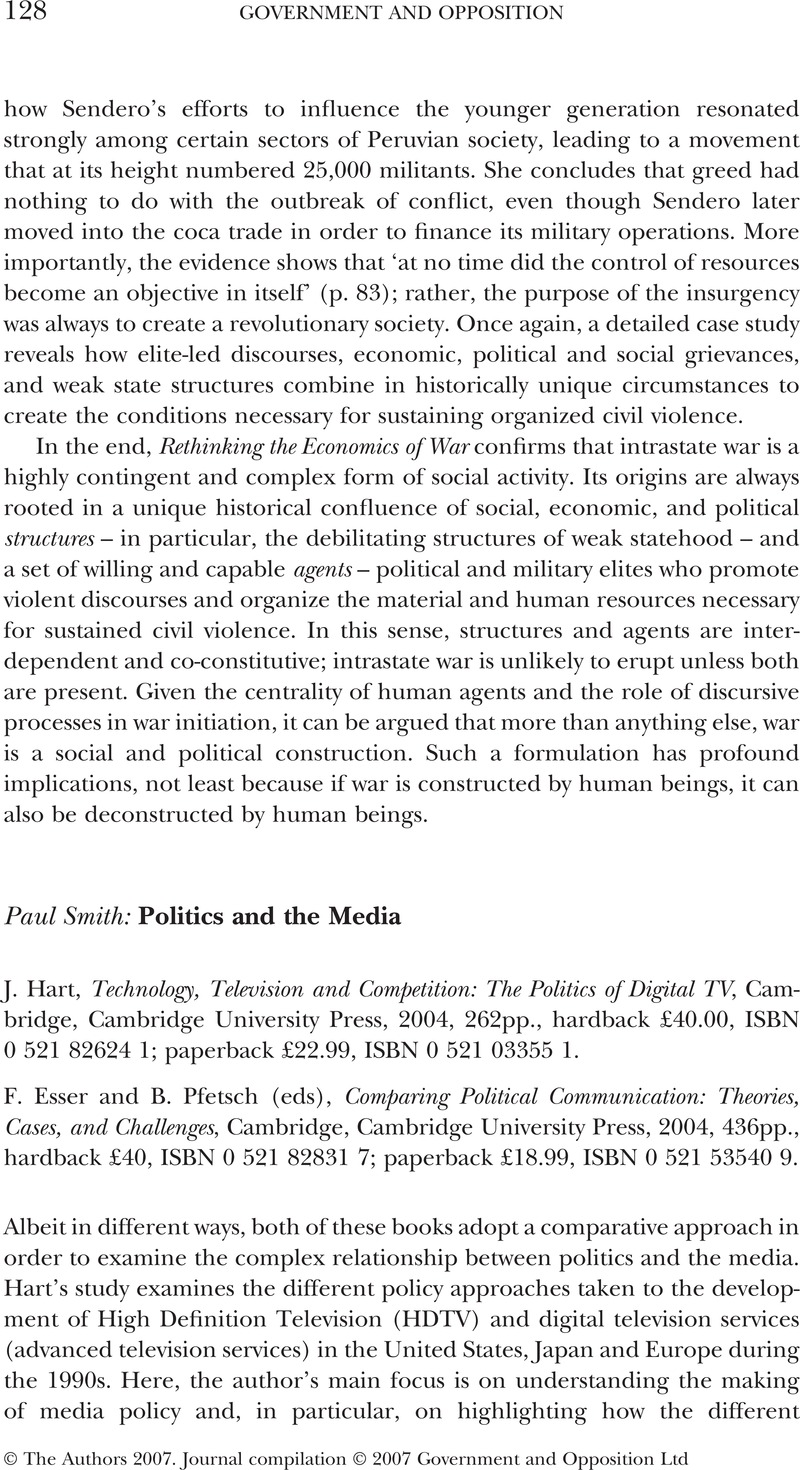No CrossRef data available.
Article contents
Abstract

- Type
- Review Articles
- Information
- Copyright
- Copyright © Government and Opposition Ltd 2007
References
1 Department for Culture, Media and Sport, Creative Industries Mapping Document, London, HMSO, 2001, p. 13.Google Scholar
2 See Cawson, Alan, ‘High Definition Television in Europe,’ Political Quarterly, 66: 2 (1995, pp. 157–73.CrossRefGoogle Scholar
3 Bennett, Colin J., ‘What is Policy Convergence and What Causes It?,’ British Journal of Political Science, 21 (1991, pp. 215–33.CrossRefGoogle Scholar
4 Sabatier, Paul, ‘Towards Better Theories of the Policy Process,’ Political Science and Politics, 24: 2 (1991, pp. 147–56.CrossRefGoogle Scholar
5 Richardson, Jeremy, ‘Doing Less by Doing More: British Government 1979–1993,’ West European Politics, 17: 3 (1994, pp. 179–97CrossRefGoogle Scholar; John Pierre, Debating Governance, Oxford, Oxford University Press, 2000. John Pierre and Gerry Stoker, ‘Towards Multi-Level Governance’, in Peter Dunleavy, Andrew Gamble, Ian Holliday and Gillian Peele (eds), Developments in British Politics 6, Basingstoke, Macmillan, 2000, pp. 29–46.
6 Rhodes, Rod, ‘The Hollowing Out of the State,’ Political Quarterly, 65: 2 (1994, pp. 138–51.CrossRefGoogle Scholar
7 Ibid. p. 138.Google Scholar
8 Majone, Giandomenico, ‘From Positive to the Regulatory State: Causes and Consequences of Changes in the Mode of Governance,’ Journal of Public Policy, 17: 2 (1997, pp. 139–67.CrossRefGoogle Scholar
9 David Richards and Martin Smith, Governance and Public Policy in the UK, Oxford, Oxford University Press, 2002, pp. 281–2.Google Scholar
10 Hernan Galperin, New Television, Old Politics: The Transition to Digital TV in the United States and Britain, Cambridge, Cambridge University Press, 2004, pp. 6–7.Google Scholar
11 Kaitatzi-Whitlock, Sophia, ‘The Privatizing of Conditional Access Control in the European Union,’ Communications & Strategies, 25: 1 (1997, pp. 91–121.Google Scholar
12 Dan Milmo and Jane Martinson, ‘Brown's Role in TV Football Negotiations’, Guardian, 21 October 2005, p. 3.Google Scholar
13 Herbert Schiller, Mass Communication and the American Empire, Boulder, CO, Westview, 1969; Oliver Boyd-Barrett, ‘Media Imperialism: Towards an International Framework for the Analysis of Media Systems’, in James Curran, Michael Gurevitch and Janet Woollacott (eds), Mass Communication and Society, London, Arnold, 1977, pp. 116–35.Google Scholar
14 John Sinclair, Elizabeth Jacka and Stuart Cunningham, New Patterns in Global Television: Peripheral Vision, Oxford, Oxford University Press, 1996.Google Scholar
15 JohnTomlinson, Cultural Imperialism: A Critical Introduction, London, Pinter Publishers, 1991.Google Scholar
16 Robertson, Roland, ‘Globalisation or Glocalisation,’ Journal of International Communications, 1: 1 (1994, pp. 33–52.CrossRefGoogle Scholar
17 For an up-to-date and in-depth discussion of how these forces shape the international trade in television programming see Jeanette Steemers, Selling Television: British Television in the Global Marketplace, London, BFI Publishing, 2004.Google Scholar
18 Bob Franklin, Packaging Politics: Political Communications in Britain's Media Democracy, London, Arnold, 2004; Ivor Gaber and Steven Barnett, Westminster Tales: The 21st Century Crisis in British Journalism, London, Continuum, 2001; Jay Blumler and Michael Gurevitch, The Crisis of Public Communication, London, Routledge, 1995.Google Scholar
19 Blumler and Gurevitch, The Crisis of Public Communication, p. 1.Google Scholar
20 Margaret Scammell, Designer Politics: How Elections are Won, Basingstoke, Macmillan, 1995; Dominic Wring, The Politics of Marketing the Labour Party, Basingstoke, Palgrave, 2005.Google Scholar


